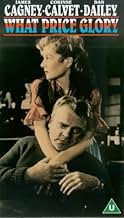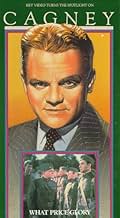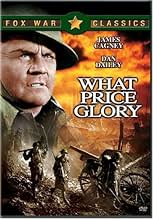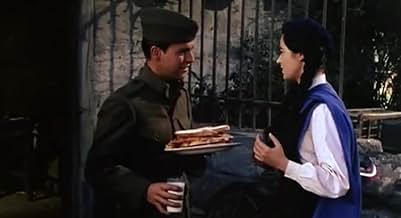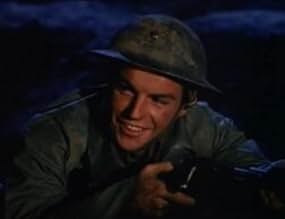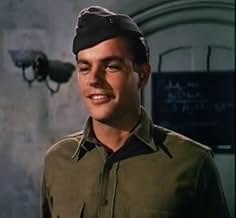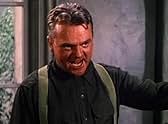IMDb RATING
6.1/10
1.5K
YOUR RATING
The wartime romantic misadventures of Captain Flagg, commander of a company of US Marines in 1918 France.The wartime romantic misadventures of Captain Flagg, commander of a company of US Marines in 1918 France.The wartime romantic misadventures of Captain Flagg, commander of a company of US Marines in 1918 France.
Max Showalter
- Lt. Moore
- (as Casey Adams)
Luis Alberni
- Grand Uncle
- (uncredited)
Olga Andre
- Sister Clothilde
- (uncredited)
Tina Blagoi
- Mrs. Bouchard
- (uncredited)
Danny Borzage
- Gilbert
- (uncredited)
George Bruggeman
- German Lieutenant
- (uncredited)
Frederic Brunn
- German Officer
- (uncredited)
Paul Bryar
- Charmaine's Uncle
- (uncredited)
Featured reviews
In 1918, in Bar-de-Duc, France, the leader of a company of Marines in the front, Captain Flagg (James Cagney), receives a group of green replacements and his disaffection, the tough Sergeant Quirt (Dan Dailey). Their rivalry increases when they both feel attracted by the same easy woman and daughter of the local innkeeper, Charmaine (Corinne Calvet).
What a disappointing and silly parody of war this "What Price Glory" is! Directed by John Ford and with James Cagney in the cast, I could not believe that this film would be so weak. Today I have watched "The Road to Glory", a great anti-war movie directed by Howard Hawks that shows the barbarian life in the trenches in WWI. However, John Ford has made neither a comedy (like Robert Altman's "MASH"), nor a romance or drama or war movie. Actually it is a messy feature, too silly and not funny for a comedy, too heavy for a romance and unreal for a drama or war, but with a magnificent cinematography and a lovely Corinne Calvet. My vote is five.
Title (Brazil): "Sangue por Glória" ("Blood for Glory")
What a disappointing and silly parody of war this "What Price Glory" is! Directed by John Ford and with James Cagney in the cast, I could not believe that this film would be so weak. Today I have watched "The Road to Glory", a great anti-war movie directed by Howard Hawks that shows the barbarian life in the trenches in WWI. However, John Ford has made neither a comedy (like Robert Altman's "MASH"), nor a romance or drama or war movie. Actually it is a messy feature, too silly and not funny for a comedy, too heavy for a romance and unreal for a drama or war, but with a magnificent cinematography and a lovely Corinne Calvet. My vote is five.
Title (Brazil): "Sangue por Glória" ("Blood for Glory")
One of the great anti-war plays of the 1920s was Maxwell Anderson's What Price Glory. The play expressed popular American feeling that we were never going to war again like that and endure the slaughter in those trenches in France that occurred in the short time we were there. Remember we only declared war in 1917 and the thing had been going on in Europe for three years by the time we got there.
One of the things Woodrow Wilson as President and the American Expeditionary Force commander John Pershing insisted on was that the American army when fully trained would fight as a unit and not just be replacement troops for the French and British already there. They deviated only once from that policy when the American First Marine Division became the first American troops in battle in World War I at Belleau Wood. These Marines depicted here are part of those troops.
John Ford is one of our great American directors and when he does his own work on material never before used he's produced some remarkable cinema. But here he takes a serious anti-war play and turns it into one of his service comedies. There certainly are comedic elements in What Price Glory, but it's a serious picture.
The original silent film version done by Raoul Walsh was faithful to Maxwell Anderson's spirit and introduced those two Marines Edmund Lowe and Victor McLaglen who were so popular as Captain Flagg and Sergeant Quirt that they went and starred in a slew of buddy films. In fact they and James Cagney and Pat O'Brien introduced and popularized the buddy film genre.
Cagney steps into McLaglen shoes here and Dan Dailey plays Sergeant Quirt. They played two belligerent oafs in this and play them well, but no one ever thought of re-teaming them.
John Ford should have let this classic alone.
One of the things Woodrow Wilson as President and the American Expeditionary Force commander John Pershing insisted on was that the American army when fully trained would fight as a unit and not just be replacement troops for the French and British already there. They deviated only once from that policy when the American First Marine Division became the first American troops in battle in World War I at Belleau Wood. These Marines depicted here are part of those troops.
John Ford is one of our great American directors and when he does his own work on material never before used he's produced some remarkable cinema. But here he takes a serious anti-war play and turns it into one of his service comedies. There certainly are comedic elements in What Price Glory, but it's a serious picture.
The original silent film version done by Raoul Walsh was faithful to Maxwell Anderson's spirit and introduced those two Marines Edmund Lowe and Victor McLaglen who were so popular as Captain Flagg and Sergeant Quirt that they went and starred in a slew of buddy films. In fact they and James Cagney and Pat O'Brien introduced and popularized the buddy film genre.
Cagney steps into McLaglen shoes here and Dan Dailey plays Sergeant Quirt. They played two belligerent oafs in this and play them well, but no one ever thought of re-teaming them.
John Ford should have let this classic alone.
This patriotic war film is the bees knees for slap stick, witty comedy. The mixture of wussy brown nosing privates and annoyed sarcastic generals provides a hilarious bitter sweet feeling that can put a smile on your face. Not to mention the constant friendly rivalry between the comedic loud mouthed Captain Flagg (Cagney being Cagney), and the irritated Sergeant Quirt played by Dailey, for the cute and innocent French waitress Charmaine. This movie not only made a great world war 1 film, but proved Cagney was still his energetic, pound for pound, hard nosed self even at 53 years old. The only downside to the movie was the poorly portrayed dramatic war speeches and the failed attempts at giving a life lesson. But all around 8/10
Marine buddies James Cagney (as Captain Flagg) and Dan Dailey (as Sergeant Quirt) carouse through World War I, and eventually become rivals for the affections of beautifully-proportioned Frenchwoman Corinne Calvet (as Charmaine). Newly arriving from Philadelphia, handsome 22-year-old Robert Wagner (as Private Lewisohn) is attracted to local 17-year-old Marisa Pavan (as Nicole Bouchard). The pretty, dark-haired girl's father is upset. Rivaling Mr. Wagner for handsomeness, Craig Hill (as Aldrich) asks the titular question, "What price glory?" Future TV stars William Demarest and Harry Morgan support the troops...
This successful stage comedy-drama became a huge "silent" film hit for Fox in 1926, winning Quigley Publications "Best Picture" award and rising high in everyone's "Ten Best" list for the year. This 1952 re-make did not score as well with audiences...
One of the original film's "all-talking" comedy sequels was the semi-musical "The Cock-Eyed World" (1929), which is how this project was initially envisioned. We have colorful cinematic sets, a few remaining musical performances and stage-lighting techniques. Director John Ford and the Fox personnel assembled were much more aware of the earlier films, helping to explain this misfire. The story began as an anti-war statement; while present, the point gets lost in the inebriated interplay between Mr. Cagney and Mr. Dailey. The actors are forced to alternate between broad "F Troop"-style antics and the accumulation of dead bodies.
***** What Price Glory (7/25/52) John Ford ~ James Cagney, Dan Dailey, Corinne Calvet, Robert Wagner
This successful stage comedy-drama became a huge "silent" film hit for Fox in 1926, winning Quigley Publications "Best Picture" award and rising high in everyone's "Ten Best" list for the year. This 1952 re-make did not score as well with audiences...
One of the original film's "all-talking" comedy sequels was the semi-musical "The Cock-Eyed World" (1929), which is how this project was initially envisioned. We have colorful cinematic sets, a few remaining musical performances and stage-lighting techniques. Director John Ford and the Fox personnel assembled were much more aware of the earlier films, helping to explain this misfire. The story began as an anti-war statement; while present, the point gets lost in the inebriated interplay between Mr. Cagney and Mr. Dailey. The actors are forced to alternate between broad "F Troop"-style antics and the accumulation of dead bodies.
***** What Price Glory (7/25/52) John Ford ~ James Cagney, Dan Dailey, Corinne Calvet, Robert Wagner
Built around cynicism and a love triangle that reminds me more of lesser Wilder or maybe even lesser Hawks than lesser John Ford, What Price Glory is a bit of a mess of a film about two romantic rivals competing over the affections of one woman with the backdrop of the First World War. A remake of a 1926 silent film starring long-time Ford stalwart Victor McLaglan (who does not appear in this film), it feels like Ford tried to twist a screenplay that didn't fit his sensibilities and only got so far, ending with a final product that never feels like it settles into one kind of story to tell.
Captain Flagg (James Cagney) leads a battalion of American troops behind the trench lines near the German front, having made his headquarters in a small French town where his men frequent the café and inn owned by the father of Charmaine (Corinne Calvet) with whom Flagg is having a love affair. Into this situation comes Flagg's newest officer, First Sergeant Quirt (Dan Dailey), who is to take responsibility for the welfare and training of the new recruits as top sergeant. The problem is that Flagg and Quirt have a history back in the Philippines when Quirt stole Flagg's girl, a girl Flagg had planned on marrying. The first half of the film is a borderline light comedy about the two men reigniting their animosity (having a pair of quick and impromptu boxing matches in Flagg's office), Quirt taking advantage of Flagg's trip to Paris when he leaves Charmaine behind by courting the pretty French girl, and Flagg trying to figure out if he's going to punish Quirt by forcing Quirt to leave Charmaine or marry her. There are other events, like Private Lewisohn (Robert Wagner) falling for another French girl Nicole Bouchard (Marisa Pavan), giving us the only remnants of the original idea of making the film a musical when Nicole sings a song to Lewisohn.
Then the battalion gets called to the front, and I thought I knew where the film was going to go. I thought, this being a John Ford film, the two men, Flagg and Quirt, would bond over their mutual experiences at the front. One of them would die in action, and the other would go back to Charmaine to marry her as much out of love for the girl as out of a sense of duty to the fallen comrade. I was confident for about twenty minutes as the film gained the kind of sober seriousness movies about trench warfare in World War I generally receive.
However, that's not what I actually got. Now, I'm not lukewarm on the film because it didn't play out as I expected. I'm lukewarm on it because what actually played out is some combination of not very good and confused. There's a serious tonal issue that begins popping up that never goes away that I feel is a symptom of a deeper problem and not the problem itself. The love triangle simply ends up continuing.
Flagg has been given a mission to sneak across enemy lines and capture a German officer in order to extract information about a potential big push by the Germans supposedly coming up soon. After sending several young men to die in one effort, Flagg, desperate to go back to Charmaine and deny Quirt the wedding Flagg himself had arranged for the pair, suddenly realizing the depths of his emotions for Charmaine, takes Quirt across the lines where they almost capture a German colonel who dies in the retreat back to the American lines. Then...in front of a wounded young soldier, Lewisohn brings in a German lieutenant randomly. It's almost comedic how the German prisoner suddenly appears right after Flagg and Quirt (who's been wounded and will be going back to the rear to potentially marry Charmaine) deliver their news of their failure. And then it becomes a chase as Flagg tries to figure out a way back to the rear while Quirt gets sent to a military hospital to deal with his wounds.
The cynicism of the two as they finally confront Charmaine, who goes from a fun cinematic creation in the beginning to a frustratingly indecisive and passive character by the end, trying to decide things as they get very quickly drunk and over a single hand of five card poker, feels nothing like what John Ford would deliver. This is where I began having my thoughts about the film feeling more at home in the body of work with either Wilder or Hawks. It wouldn't suddenly be a good film if the other two had made it, but it would just more naturally fit with the films around it. Ford is usually too heartfelt to offer up something this cynical.
And that cynicism is really what bothers me because it doesn't really feel like it belongs, which is seemingly a weird thing to say about a movie about World War I. Movies about The Great War generally should be cynical because of the wanton human suffering it caused, but the hour and a half that preceded that descent into cynicism doesn't support this. The film isn't actually about the waste of human life that was the war. The same story could have been told in the setting of World War II, to be honest, and not much would have needed to change outside the setting of the battle. It's about a love triangle in the time of war, the temporal nature of life in a warzone (reminding me in particular of They Were Expendable), and...then it seems to go off the deep end. The final moments of the film try to walk back the cynicism as well, with both Flagg and Quirt deciding to say goodbye to Charmaine forever to join up with the Big Push, as though it's Ford, in the movie's closing, trying to insert that common motif of the brotherhood of arms that is the military. But it creates this real whiplash at the ending.
Cagney also feels wrong for the role of Flagg. He may actually be part of the problem with the tone of the latter parts of the film because he simply cannot calm down in a scene. He has to be the center of attention, even if the scene is quiet. Dan Dailey fares better as Quirt, though since he's often sharing scenes with Cagney he can sometimes get lost. The character of Charmaine may end up devolving a bit in the face of the two men fighting over her (I would have really liked it if she had simply walked out on both men during the poker game, but alas, she does not), but Corinne Calvet has a wonderful sense of life and sadness about her that mostly makes up for the latter changes in her character. Wagner also has a certain melancholy and innocence that the movie can't quite take advantage of.
It's also often quite nice to look at. Once again returning to use Technicolor, Ford used color well and intelligently, especially in the trenches. There's a moment where Lewisohn moves into the doorway of a shelter, infused with red-lit fog in the corner of the frame, and it's quite striking. There are also moments in No Man's Land that could be considered beautiful if not for the brutality on display.
I'm now curious to watch the original 1926 film to see if that shares some of the same problems or even ends the same way. Ford was famous for using scripts as recommendations as much as an actual guide, and it wouldn't surprise me if he had riffed a lot of the action on screen with his actors (abusing them all the way, surely) while never really addressing how what he was doing was going to affect the overall film. Its opening is too nice, and its second half is too handsome to dismiss the film out of hand. However, it's really not any kind of lost gem.
Captain Flagg (James Cagney) leads a battalion of American troops behind the trench lines near the German front, having made his headquarters in a small French town where his men frequent the café and inn owned by the father of Charmaine (Corinne Calvet) with whom Flagg is having a love affair. Into this situation comes Flagg's newest officer, First Sergeant Quirt (Dan Dailey), who is to take responsibility for the welfare and training of the new recruits as top sergeant. The problem is that Flagg and Quirt have a history back in the Philippines when Quirt stole Flagg's girl, a girl Flagg had planned on marrying. The first half of the film is a borderline light comedy about the two men reigniting their animosity (having a pair of quick and impromptu boxing matches in Flagg's office), Quirt taking advantage of Flagg's trip to Paris when he leaves Charmaine behind by courting the pretty French girl, and Flagg trying to figure out if he's going to punish Quirt by forcing Quirt to leave Charmaine or marry her. There are other events, like Private Lewisohn (Robert Wagner) falling for another French girl Nicole Bouchard (Marisa Pavan), giving us the only remnants of the original idea of making the film a musical when Nicole sings a song to Lewisohn.
Then the battalion gets called to the front, and I thought I knew where the film was going to go. I thought, this being a John Ford film, the two men, Flagg and Quirt, would bond over their mutual experiences at the front. One of them would die in action, and the other would go back to Charmaine to marry her as much out of love for the girl as out of a sense of duty to the fallen comrade. I was confident for about twenty minutes as the film gained the kind of sober seriousness movies about trench warfare in World War I generally receive.
However, that's not what I actually got. Now, I'm not lukewarm on the film because it didn't play out as I expected. I'm lukewarm on it because what actually played out is some combination of not very good and confused. There's a serious tonal issue that begins popping up that never goes away that I feel is a symptom of a deeper problem and not the problem itself. The love triangle simply ends up continuing.
Flagg has been given a mission to sneak across enemy lines and capture a German officer in order to extract information about a potential big push by the Germans supposedly coming up soon. After sending several young men to die in one effort, Flagg, desperate to go back to Charmaine and deny Quirt the wedding Flagg himself had arranged for the pair, suddenly realizing the depths of his emotions for Charmaine, takes Quirt across the lines where they almost capture a German colonel who dies in the retreat back to the American lines. Then...in front of a wounded young soldier, Lewisohn brings in a German lieutenant randomly. It's almost comedic how the German prisoner suddenly appears right after Flagg and Quirt (who's been wounded and will be going back to the rear to potentially marry Charmaine) deliver their news of their failure. And then it becomes a chase as Flagg tries to figure out a way back to the rear while Quirt gets sent to a military hospital to deal with his wounds.
The cynicism of the two as they finally confront Charmaine, who goes from a fun cinematic creation in the beginning to a frustratingly indecisive and passive character by the end, trying to decide things as they get very quickly drunk and over a single hand of five card poker, feels nothing like what John Ford would deliver. This is where I began having my thoughts about the film feeling more at home in the body of work with either Wilder or Hawks. It wouldn't suddenly be a good film if the other two had made it, but it would just more naturally fit with the films around it. Ford is usually too heartfelt to offer up something this cynical.
And that cynicism is really what bothers me because it doesn't really feel like it belongs, which is seemingly a weird thing to say about a movie about World War I. Movies about The Great War generally should be cynical because of the wanton human suffering it caused, but the hour and a half that preceded that descent into cynicism doesn't support this. The film isn't actually about the waste of human life that was the war. The same story could have been told in the setting of World War II, to be honest, and not much would have needed to change outside the setting of the battle. It's about a love triangle in the time of war, the temporal nature of life in a warzone (reminding me in particular of They Were Expendable), and...then it seems to go off the deep end. The final moments of the film try to walk back the cynicism as well, with both Flagg and Quirt deciding to say goodbye to Charmaine forever to join up with the Big Push, as though it's Ford, in the movie's closing, trying to insert that common motif of the brotherhood of arms that is the military. But it creates this real whiplash at the ending.
Cagney also feels wrong for the role of Flagg. He may actually be part of the problem with the tone of the latter parts of the film because he simply cannot calm down in a scene. He has to be the center of attention, even if the scene is quiet. Dan Dailey fares better as Quirt, though since he's often sharing scenes with Cagney he can sometimes get lost. The character of Charmaine may end up devolving a bit in the face of the two men fighting over her (I would have really liked it if she had simply walked out on both men during the poker game, but alas, she does not), but Corinne Calvet has a wonderful sense of life and sadness about her that mostly makes up for the latter changes in her character. Wagner also has a certain melancholy and innocence that the movie can't quite take advantage of.
It's also often quite nice to look at. Once again returning to use Technicolor, Ford used color well and intelligently, especially in the trenches. There's a moment where Lewisohn moves into the doorway of a shelter, infused with red-lit fog in the corner of the frame, and it's quite striking. There are also moments in No Man's Land that could be considered beautiful if not for the brutality on display.
I'm now curious to watch the original 1926 film to see if that shares some of the same problems or even ends the same way. Ford was famous for using scripts as recommendations as much as an actual guide, and it wouldn't surprise me if he had riffed a lot of the action on screen with his actors (abusing them all the way, surely) while never really addressing how what he was doing was going to affect the overall film. Its opening is too nice, and its second half is too handsome to dismiss the film out of hand. However, it's really not any kind of lost gem.
Did you know
- TriviaJohn Ford was an uncredited second unit director in the 1926 version directed by Raoul Walsh.
- GoofsCaptain Flagg's command was referred to as L Company, 5th Marines. In WWI Marine Companies were numbered. Prior to WWI they served independently with battalions and above were ad hoc organizations. 5th Marines should 5th Regiment. The change from Regiment to Marines wouldn't come until the 30s.
- Quotes
Captain Flagg: It's a lousy war, kid... but it's the only one we've got.
- ConnectionsFeatured in Las Vegas, un couple (1970)
- SoundtracksOui, Oui, Marie
(uncredited)
Music by Fred Fisher
Lyrics by Al Bryan and Joseph McCarthy
Sung by Corinne Calvet and chorus
- How long is What Price Glory?Powered by Alexa
Details
- Release date
- Country of origin
- Languages
- Also known as
- Au service de la gloire
- Filming locations
- Marine Corps Base Camp Pendleton, California, USA(army base scenes)
- Production company
- See more company credits at IMDbPro
- Runtime
- 1h 51m(111 min)
- Aspect ratio
- 1.37 : 1
Contribute to this page
Suggest an edit or add missing content


